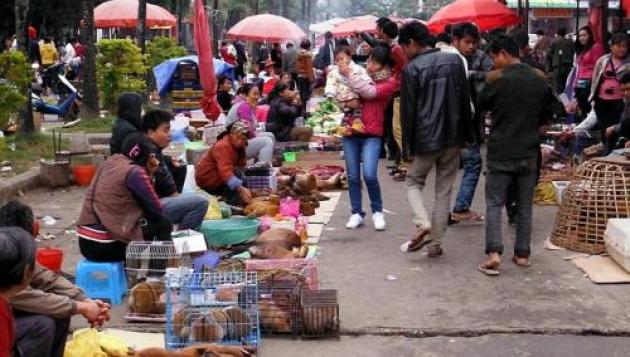All kinds of illegal trade on Myanmar's border

Myanmar's border town of Mongla does a brisk trade in rare species like the big-eyed Bengal slow loris, wanted by the Chinese for its purported medicinal value.
Thousands of this shy tropical primate are killed and sold in the town every year, a report by the wildlife trade investigation agency, Traffic, said last week.
This goes against Myanmar's laws and the Convention on International Trade in Endangered Species (Cites) to which Myanmar and China are signatories.
But the sale of slow loris is only the tip of the iceberg of the rampant illegal trade in exotic animals, drugs, timber, and precious gems taking place on the Myanmar-China and Laos-China borders.
The problem for Myanmar government agencies is their lack of control over some border areas, especially places like Mongla in eastern Shan state. The town - virtually an independent fiefdom operating on Chinese currency, electricity and mobile phone networks - is run by Sai Leung, also known as Lin Min Xiang, who has his own 3,000-strong National Democratic Alliance Army.
Further south, also in Shan state near the border with Thailand, Myanmar government agencies have a presence and police and the army are active.
But they must still contend with other armed groups. The United Wa State Army (UWSA) recently ignored a government order and deployed its own troops to protect a trading hub specifically to facilitate the opium, heroin and methamphetamine trade, The Irrawaddy journal reported.
The magazine quoted a local businessman as saying the UWSA last month shot dead a man who claimed he owned some land seized by Wa troops.
The shooting, in a restaurant in the centre of Tachilek, across the border from the Thai town of Mae Sai, sent a clear message.
"Nobody dared to say a word," said the businessman. "All incidents such as the death… and land confiscation by the UWSA troops were reported to respective local authorities. But no actions are taken. We can't rely on them (the authorities)."
Official law enforcement agencies have had only sporadic success. Last October, a joint Thai- Myanmar operation uncovered and seized about 232kg of heroin being trucked to the Thai border town of Mae Sai.
More recently, in Kachin state, Myanmar's military seized tonnes of timber and arrested 122 people, most of whom are "believed to be Chinese", according to a state-run newspaper. The suspects had permits to export the timber to China issued by the Kachin Independence Army (KIA).
It was a signal from the Myanmar government to the Kachin and to China, that "we know what you are up to", one analyst said.
China's foreign ministry spokesman Hong Lei last week said its embassy in Myanmar was trying to verify details.
Places like Mongla do not have Cites offices, which monitor compliance with the convention which regulates trade in endangered species from plants to animals.
"We have no control," a Myanmar government official said candidly on condition of anonymity. Any attempt at addressing the situation would have to be through political dialogue, he added.
Ongoing peace talks and a future political dialogue between the Myanmar government and ethnic armed groups may be the key to change. But with not only power but also billions of dollars involved, any change is still years down the road.
In such a situation, analysts say, it is up to China to stop the trade which is emptying mainland Southeast Asia of its natural resources.
"I think the government of Myanmar overall is very keen to tackle the wildlife trade," Kuala Lumpur-based Chris Shepherd of Traffic told The Straits Times on the phone.
"There has been enforcement action," he said. "But in this particular region they don't have any authority to deal with crime. The onus of this one is really on China."
RELATED
